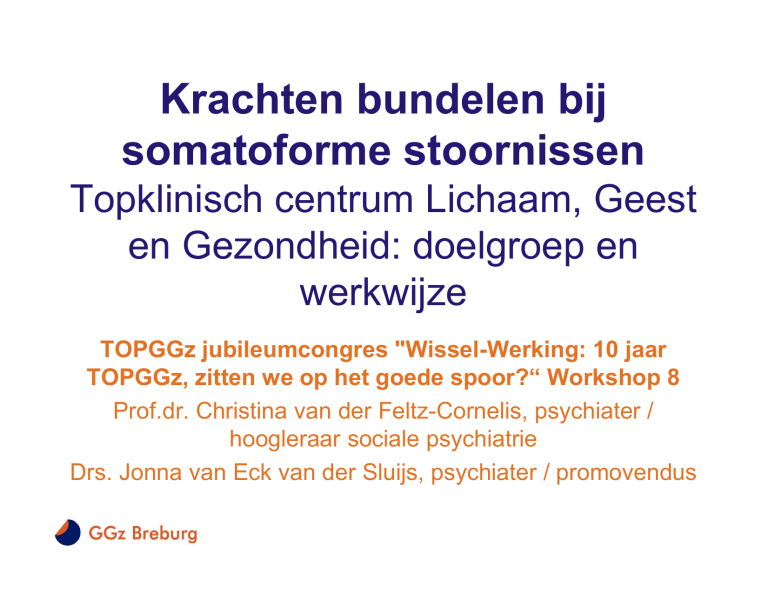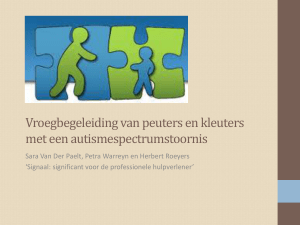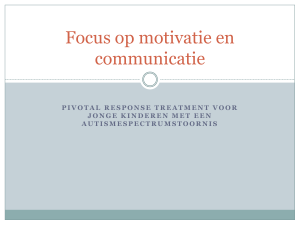
Krachten bundelen bij
somatoforme stoornissen
Topklinisch centrum Lichaam, Geest
en Gezondheid: doelgroep en
werkwijze
TOPGGz jubileumcongres "Wissel-Werking: 10 jaar
TOPGGz, zitten we op het goede spoor?“ Workshop 8
Prof.dr. Christina van der Feltz-Cornelis, psychiater /
hoogleraar sociale psychiatrie
Drs. Jonna van Eck van der Sluijs, psychiater / promovendus
Disclosures belangen sprekers
• Christina van der Feltz-Cornelis:geen (potentiële)
belangenverstrengeling
• Jonna van Eck van der Sluijs: geen (potentiële)
belangenverstrengeling
Inhoud
•
•
•
•
•
Doelgroep CLGG
Werkwijze CLGG
Ontwikkelingen
Samenwerking (boven)regionale keten
Samenwerking landelijk
Doelgroep
• Leeftijd boven 18 (Jeugd: consultatie of
deelbehandeling)
• Hulpvraag gericht combinatie van lichamelijke
en psychische klachten
• Geen alcohol- en/of drugsmisbruik
• Geen actieve (dreigende) suïcidaliteit
Veel voorkomende klachten
•
•
•
•
•
•
•
•
Chronische pijn
Fibromyalgie
Chronische vermoeidheid/CVS
Buikklachten, maag- en darmklachten,
prikkelbaar darmsyndroom
Somatisch onvoldoende verklaarde klachten
Lichamelijke klachten die samenhangen met
een trauma
Hartkloppingen
Pijn op de borst
Daarnaast ook somberheid en/of angst in
combinatie met lichamelijke klachten en
klachten die horen bij een chronische
lichamelijke aandoening (bv DM, HVZ,
hersenletsel), die ernstiger zijn of langer
duren dan te verwachten, waarvoor het
moeite kost om ermee om te gaan.
Patients with SSRD in our Centre of
excellence: previous treatment
• Mean duration of physical symptoms 8,5 year (range 134 year)
• Mean duration of earlier treatment 6,9 year without effect
(range 1-34 year)
– in SMHI
– in GH
– GP/ medical specialists
• Conflicts
• Comorbidities on multiple axes
• Social deterioration comparable to serious mental
disorders
Van der Feltz Cornelis GGz Breburg Tilburg
University
INTERMED outcomes of patients with SSRD
Patients with SSRD
(N = 226)
Biological domain
Chronicity
Diagnostic dilemma
Severity of symptoms
Diagnostic challenge
Complications and life threat
10.1 (2.0)
1.6 (0.7)
2.5 (1.0)
1.9 (0.4)
2.8 (0.7)
1.4 (0.6)
Psychological domain
Restrictions in coping
Psychiatric dysfunction
Resistance to treatment
Psychiatric symptoms
Mental health threat
7.2
1.7
1.7
0.3
1.9
1.7
(2.3)
(1.0)
(0.8)
(0.5)
(0.6)
(0.6)
Social domain
Restriction in integration
Social dysfunction
Residential instability
Restrictions of network
Social vulnerability
4.5
1.7
1.0
0.4
1.2
0.3
(2.9)
(1.1)
(0.9)
(0.6)
(0.9)
(0.6)
Healthcare domain
Intensity of treatment
Treatment experience
Organization of care
Appropriateness of referral
Coordination of health care
1.6
0.1
0.4
0.6
0.2
0.2
(1.8)
(0.2)
(0.8)
(0.6)
(0.5)
(0.5)
INTERMED Total Score
23.3 (5.9)
Outcomes are displayed as mean (standard deviations)
Note: variable scores range from 0 to 3, domain scores range
from 0 to 15. A total score ≥21 indicates high patient complexity
INTERMED = 23.3
High complexity
Especially for:
Biological
- Diagnostic complexity
- Diagnostic challenge
Psychological
- Psychiatric symptoms
Social
- Restriction in integration
Healthcare
- Organisation of care
Personalisation based on patient
expectations for the next 6 months
• Do you expect that your physical wellbeing
will change?
• Do you expect that your mental wellbeing
will change?
• Do you expect that your living situation will
need an adaptation?
• Do you expect that you will need more
health care or an adaptation of the care?
Shared Decision Making
Decision made and commitment by professional and patient
Consult question
referring GP/specialist
Professional
Expertise
provided in
diagnostic process
and treatment
Shared
Decision
Making
Patient
Autonomy
secured in
diagnostic
process and
treatment
Feedback
instrument:
Routine Outcome
Monitoring (ROM)
during treatment
Ethical framework for diagnosis and treatment:
Professional integrity: expertise and safety provided
Autonomy of the patient: treatment choice improves participation
Van der Feltz Cornelis e.a. 2014
Werkwijze
Diagnostiek
Medische intake, lichamelijk onderzoek, psychodiagnostiek,
neuropsychologisch onderzoek, psychiatrisch onderzoek en
vragenlijstonderzoek (ROM)
Multidisciplinary care
Psychiaters, artsen, klinisch psycholoog, GZ-psychologen, neuropsychologen,
SPV, fysiotherapeut medisch specialisten
Integrated treatment
Farmacologisch, trauma, CRT, CGT, ACT, PST, consultatie, second opinion
voor verwijzende collega’s en medisch specialisten
Routine Outcome Measurements en Shared Decision Making
Feedback loop voor monitoren van behandeling met vragenlijsten gericht op
lichamelijke én psychische symptomen/klachten
Intakeprocedure
•
•
•
•
•
•
•
BeginROM
Intakegesprek + psychiatrisch onderzoek
Lichamelijk onderzoek
Psychodiagnostisch onderzoek
Neuropsychologisch onderzoek
MDO
Adviesgesprek
Verwijzing
Voor verwijzing vragen wij:
• De hulpvraag van de patiënt
• Een overzicht van eerder vastgestelde
problemen, diagnostiek en behandeling op
zowel lichamelijk als psychisch gebied
• Naar exclusiecriteria van ons centrum
• [email protected]
• Of [email protected] voor
voorbespreking
Research
•
•
•
•
•
•
Complexiteit
Vulnerability appraisal
Decision aid (e-health)
Personalisatie
Validatie SSD-12
Additie van cox-remmers bij een SSRI
voor de behandeling van depressie
Samenwerking regionaal
• Psychosomatisch fysiotherapeuten
• Huisartsen
• Medisch specialisten
Samenwerking landelijk
•
•
•
•
SOLKnet
Kenniscentrum Lichaam en Geest
Onderwijsmodule SSS (NVvP)
Kennisuitwisseling symposia/congressen
nationaal en internationaal
Libdup 5-jarig bestaan CLGG
https://youtu.be/d2i0ad0XANU
Contactgegevens
• [email protected]
• [email protected]
• Aanmelden SOLKnet:
[email protected]
– Data 2017: 26-04, 21-06, 27-09, 25-10, 29-11
– Locatie:GGz Breburg, Auditorium, Lage
Witsiebaan 4 te Tilburg, 16.30-18.00u












